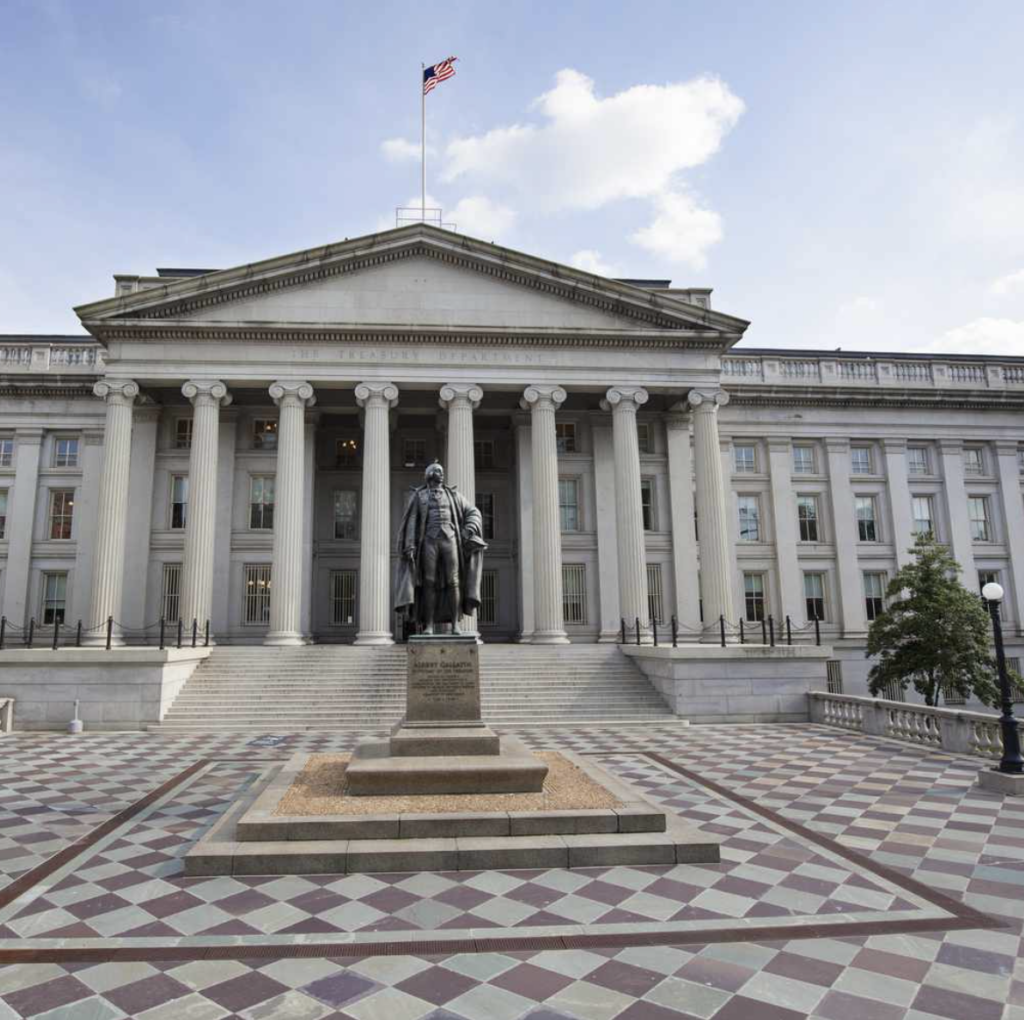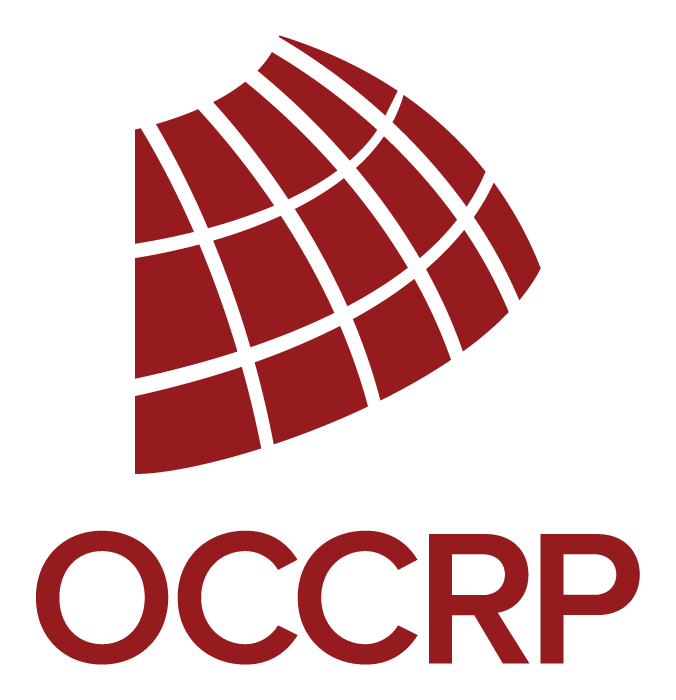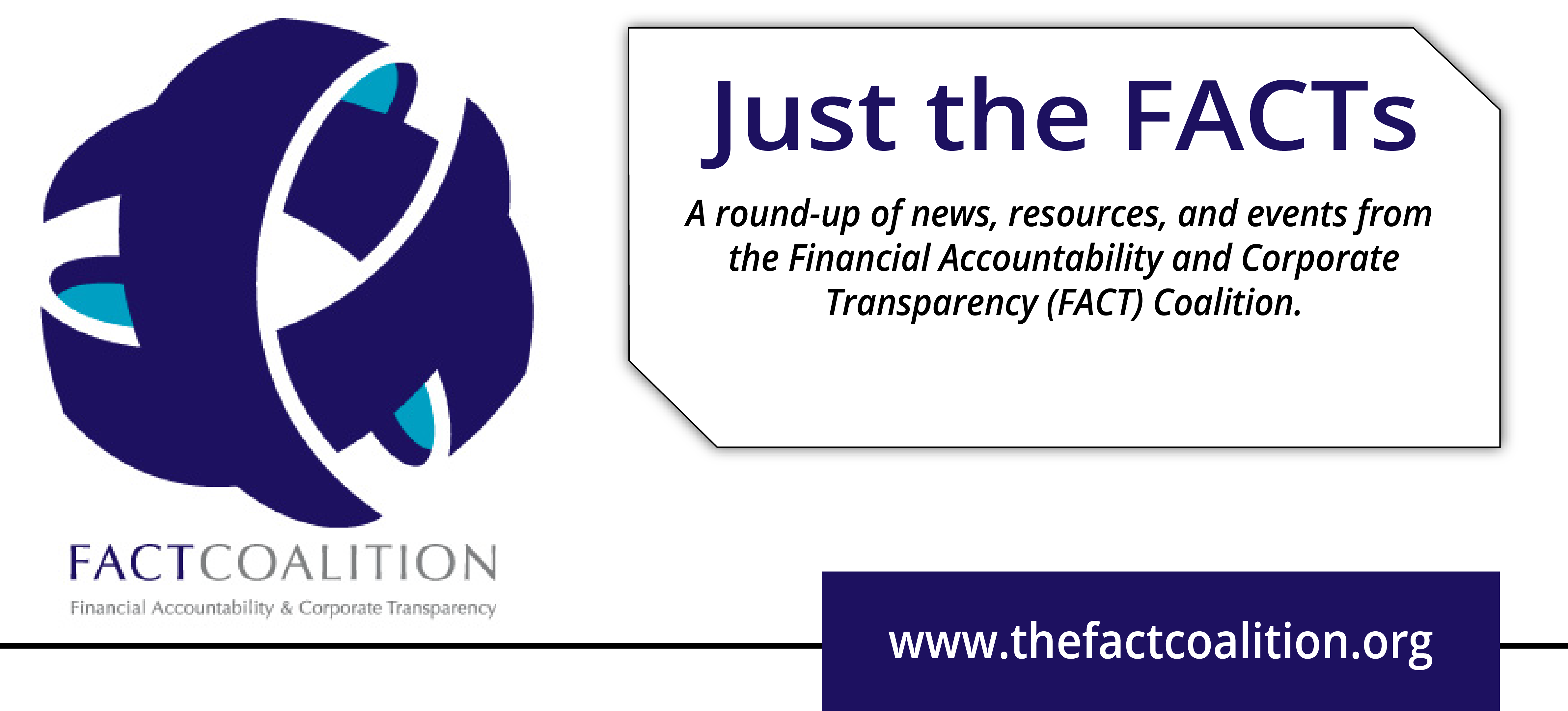“Just the FACTs” is a round-up of news stories and information regarding efforts to combat corrupt financial practices, including offshore tax haven abuses, corporate secrecy, and money laundering through the financial system.
Send feedback or items for future newsletters to Thomas Georges at tgeorges@thefactcoalition.org
Here is the State of Play
Strong Financial Transparency Law Implementation At Risk as Treasury Weighs Ownership Information Reporting Forms

The bipartisan Corporate Transparency Act (CTA), which requires anonymous companies and other entities registered in the U.S. to report identifying information on their true, “beneficial” owners, is under serious threat of being weakened by a combination of flawed rulemakings and a draft information intake form released by Treasury that could make reporting functionally optional under the law.
Last month, FACT and other advocates raised the alarm about Treasury’s second draft rule to implement the Corporate Transparency Act, which establishes burdensome requirements – some without statutory basis – for authorized users seeking to access beneficial ownership information collected under the law. These concerns were echoed by a bipartisan group of five Senators last week, who argued in a letter to Treasury’s Financial Crimes Enforcement Network (FinCEN) that the draft rule’s restrictive nature “strays from congressional intent,” and may “risk undermining the utility of the beneficial ownership directory.”
This week, FACT and 15 other organizations submitted comments to Treasury on a draft form that would be used to collect required information from reporting entities. The form in question allows filers to claim that they are “unable to obtain” fundamental identifying information about their true owners, or otherwise claim that said information is “unknown,” in direct contravention of the mandatory reporting regime established by the text of the CTA.
These twin threats to the efficacy of one of the foremost anti-money laundering (AML) accomplishments in generations have the potential to seriously undermine the Biden administration’s broader anti-corruption agenda, and leave the U.S. financial system open to abuse by bad actors shielding their identities and investments behind layers of anonymous shell companies.
Canada Introduces Legislation to Launch Public Beneficial Ownership Regime

Even as Treasury stumbles in its implementation of the CTA, the Canadian government on Wednesday introduced its long-awaited beneficial ownership transparency bill. The legislation would establish a publicly-accessible beneficial ownership register, complete with data verification – a vital feature that Treasury has yet to fully commit to in its implementation process.
Canada has long been a favored destination for international money laundering – dubbed “snow-washing – due to its stable markets, proximity to the United States, and incomplete anti-money laundering framework. Wednesday’s legislation, in combination with provincial adoption of similar registries, represents an important first step towards ending the use of anonymous entities within Canada for the purposes of tax evasion, money laundering, and other financial crimes.
The introduction of the Canadian beneficial ownership proposal is the result of years of effort not only by lawmakers, but also by Canadian civil society organizations like the End Snow-Washing Campaign, composed of Publish What You Pay Canada, Transparency International Canada, and Canadians for Tax Fairness.
Anti-corruption Groups Call for Appointment of Permanent Leadership at FinCEN
The FACT Coalition and 25 anti-corruption, national security, human rights, and environmental civil society organizations published a letter to Treasury Secretary Janet Yellen Thursday calling for the timely appointment of a permanent director at FinCEN, the nation’s chief financial intelligence unit, and the bureau of Treasury responsible for drafting multiple key AML regulations.
Despite FinCEN’s central role in implementing core aspects of the Biden Administration’s Strategy on Countering Corruption, the bureau has been languishing without permanent leadership for nearly two years. Congress has repeatedly acknowledged the importance of FinCEN’s mission through successive funding increases, and the Administration’s FY2024 budget request includes a roughly 20 percent appropriations increase for the bureau above enacted levels for this year.
Adequate funding is not the only institutional support that FinCEN requires, however. As the letter’s signatories argue, “Lack of a permanent director complicates endeavors to set a clear vision and direction, build and maintain a collaborative leadership team, and ensure staff are best able to deliver for the American people. For FinCEN to keep our financial system safe, it needs stable and senior leadership…”
AML reforms currently on FinCEN’s agenda include finalization of rulemakings and other materials necessary to fully implement the Corporate Transparency Act – some of which require major revisions – and an upcoming rulemaking to curb money laundering through U.S. real estate. An expected Advance Notice of Proposed Rulemaking revisiting AML regulations on private investment markets is also in the offing.
Latest from FACT

In a letter sent this month to Treasury Secretary Janet Yellen, FACT and a diverse group of 25 cosigners argue that the appointment of a permanent director at FinCEN is crucial to tackling the threats to U.S. national security posed by transnational criminals, terrorist organizations, kleptocrats, and the illicit financial flows that fund them.

FACT and 15 other civil society organizations are calling for the removal of fields within a proposed beneficial ownership reporting form that allow entities to claim that they are “unable to obtain” certain information statutorily required under the Corporate Transparency Act, rendering reporting effectively optional under the law.

Comment Letter: FACT Submits Comments Urging IRS to Continue Country-by-Country Data Collection
In public comments submitted earlier this month, FACT commended the Internal Revenue Service (IRS) for its ongoing efforts to collect country-by-country data from reporting entities, and urged the agency to continue publishing aggregated data based on collected information, arguing that “the tax enforcement reasons for collecting this information have not changed.”

Press Statement: Nation’s Financial Crime Fighters Poised for Needed Boost in President’s New Budget
President Biden’s discretionary budget request for FY2024 includes $229 million – a 20 percent increase above previously enacted levels – for the Financial Crimes Enforcement Network.
In a statement, FACT government affairs director Erica Hanichak noted that “One of the best steps that Congress can take to tackle dirty money is to fund the bureau of the Treasury responsible for crafting rules to root it out.”
FACT in the News

Quoted In: FinCEN’s Efforts to Implement Shell-Company Law Draw Criticism
FACT and its allies were extensively cited by the Wall Street Journal’s Dylan Tokar in coverage of Treasury’s flawed implementation of the Corporate Transparency Act, as well as of FACT’s letter calling for the appointment of permanent leadership at FinCEN.
“For nearly two years, the Bureau has gone without permanent leadership, contradicting both the gravity of FinCEN’s mission and the stated national security, economic, and criminal justice objectives of the administration.”

Cited In: Banks and Transparency Advocates Want Treasury to Rethink Corporate Disclosure Rule
“The Bank Policy Institute and the FACT Coalition are urging FinCEN to reconsider a proposed form intended to collect ownership information from businesses and support efforts to police anonymous shell companies. The big problem: The form would allow businesses to say they are unable to obtain ownership information or that it’s unknown.”

Quoted In: Feminist Economists From Africa Challenge Tax System Gender Bias
In his column for Bloomberg Tax, Don Griswold provided extensive coverage of FACT’s March 10 panel discussion on gender and tax justice.
“Women disproportionately bear the brunt of tax policy failures; poverty is highly feminized. Policies of austerity and tax burden shifting (wealthy to poor) are normalized; ‘offshore’ tax and regulation dodging are tolerated ‘while millions around the world struggle to make ends meet.’”

Quoted In: US Turns to New Ways to Punish Russian Oligarchs for the War
FACT’s Erica Hanichak was quoted in coverage by the Associated Press on upcoming Treasury rulemakings to address money laundering through U.S. real estate.
“We’re viewing this as an opportunity for the United States to demonstrate leadership not only in addressing corrupt practices abroad, but looking to our own backyard and addressing the loopholes in our system that facilitate corruption internationally.”

Quoted In: Biden Proposes Almost $500 Million to Combat Financial Crime in U.S.
Erica Hanichak was quoted through FACT’s press statement on the Biden Administration’s FY2024 budget request in coverage by the Organized Crime and Corruption Reporting Project.
“FinCEN is up against a flood of dirty money finding its way into the U.S. New resources for FinCEN would ensure the bureau has what it needs in terms of staff, licenses, and technology to keep our financial system safe… The big question now is whether Congress will deliver.”
Recent and Upcoming Events
Watch a full recording of FACT’s recent panel discussion on the intersection of gender and tax justice, co-hosted with the Nawi Collective and the Global Alliance for Tax Justice.
The event highlighted growing efforts in Africa to analyze and tackle macroeconomic systems which discriminate against women, reform campaigns designed to support the realization of women’s rights and promote gender equality, and the ways in which U.S. policies can support or undermine these efforts.

March 27: Countering Autocrats’ and oligarchs’ reputation laundering through Western institutions
As noted in the U.S. Strategy on Countering Corruption, “rule-of-law-based societies continue to provide entry points for corrupt actors to launder their funds and their reputations. Such activity negatively impacts average citizens in the United States.” This panel discussion, featuring Gary Kalman of Transparency International-US, will focus on practices of corrupt reputation laundering in the public and nonprofit sector.

March 28: Anti-Corruption as a Cornerstone of a Fair, Accountable, and Democratic Economy
From 10:30 am-12:00 pm, the U.S. Treasury Department will host an in-person event, chaired by Secretary Janet Yellen, which will bring together leaders from government, civil society, and international organizations to discuss the efforts to counter corruption and illicit finance in order to uphold the rule of law, promote good governance, and ensure an equal economic playing field. Speakers include Lakshmi Kumar of Global Financial Integrity.

March 28: Accelerating Anti-Corruption Progress & Moving to Action
From 3:15-4:30pm, USAID, the State Department, the Brookings Institution, and the Open Government Partnership will highlight progress made during the Year of Action, showcase the achievements of the FTI Cohort, and consider further collective efforts to advance progress on transnational corruption. Effective partnership and coordinated action are needed to prevent bad actors from misusing anonymous shell companies, opaque transactions, and poorly or unevenly regulated financial gatekeepers to facilitate their corruption.

March 29-30: Second Summit for Democracy
The mixed-format Second Summit for Democracy will bring together government, civil society, and private sector leaders from around the globe to reflect on progress made during the past “year of action,” and to establish new anti-corruption, pro-democracy, and accountability commitments.
About the FACT Coalition

